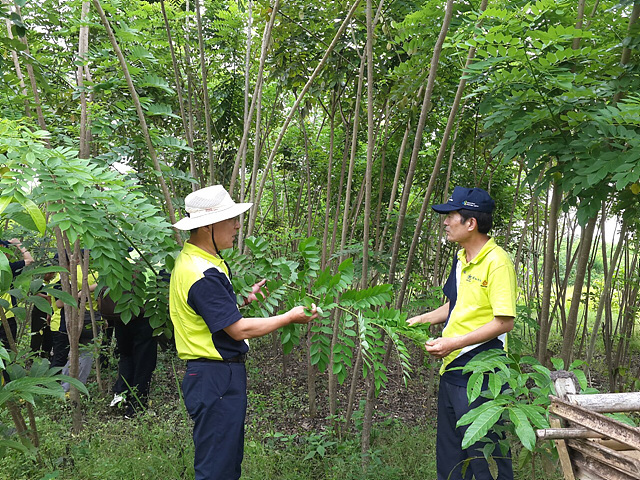 |
| Korea Forest Service officials visit a South Korea-Indonesia joint forest biomass plantation in Indonesia. (KFS) |
South Korea and Indonesia vowed stronger cooperation in forest industry and administration, South Korean forest authorities said Thursday.
The Korea Forest Service and its Indonesian counterpart held a symposium on wood biomass in the Indonesian city of Jakarta, Wednesday, to share the two countries’ forest policies and know-how. South Korean exporters seeking inroads to Indonesia also participated in the symposium to benchmark successful experiences of their forerunners.
The presentation on the KFS’s pilot project on forest biomass and its achievements since 2012 drew large interest from the participants, a KFS official said. The symposium included a debate on the developing methodology of the forest biomass industry, followed by question-and-answer session.
The KFS’s pilot project on forest biomass is one of the initiatives in a South Korea-Indonesia memorandum of understanding on the forest biomass energy industry. The MOU was signed in the wake of the South Korea-Indonesia summit of 2009.
The test project focuses on the afforestation of Gliricidia, a type of Indonesian tree that is used to produce wood pellets in only two years. Korea and Indonesia intend to plant Gliricidia on a 1,000-hectare tract of land this year, using an advanced short rotation coppice.
Wood pellets, or fuel made from biomass or compressed organic matter, has become one of the most widely recognized sources of renewable energy. A ton of this new energy can replace about 524 liters of crude oil and reduce carbon dioxide by about 1.37 tons.
The KFS estimates that, starting 2016, the third year of the pilot project, the Gliricidia plantation will yield about 15,000 tons of wood pellets per year — enough to heat 3,750 households in winter.
KFS’s business model developed through the pilot project will be shared with the Indonesian state-run afforestation company and South Korean exporters of forest products.
“The Korea-Indonesia symposium is the fruit of the rising interest in the forest biomass businesses, thanks to the recent enforcement of the mandatory supply of renewable energy,” said Im Ha-soo, an official of the overseas resource development unit of the KFS.
“The KFS will continue to develop policies for a stable supply of overseas forest resources,” he added.
The KFS plans to increase Korean investments in Indonesian forest industries by supporting the entrance of Korean private businesses in the sector and the expansion of production facilities of wood pellets in Indonesia.
Korea’s forestation investments in Indonesia date back to 1968, when Korea Development Co., a private developer, became the first business enterprise to enter the Indonesian forestation development market.
From 1993 to June 2013, a total of 12 Korean firms made inroads in the Indonesian forestation investment market. They developed forests on a total of 194,000 hectares of Indonesian soil. This is equal to 67.5 percent of the domestic forestation investment by Korean companies.
By Chung Joo-won (joowonc@heraldcorp.com)

